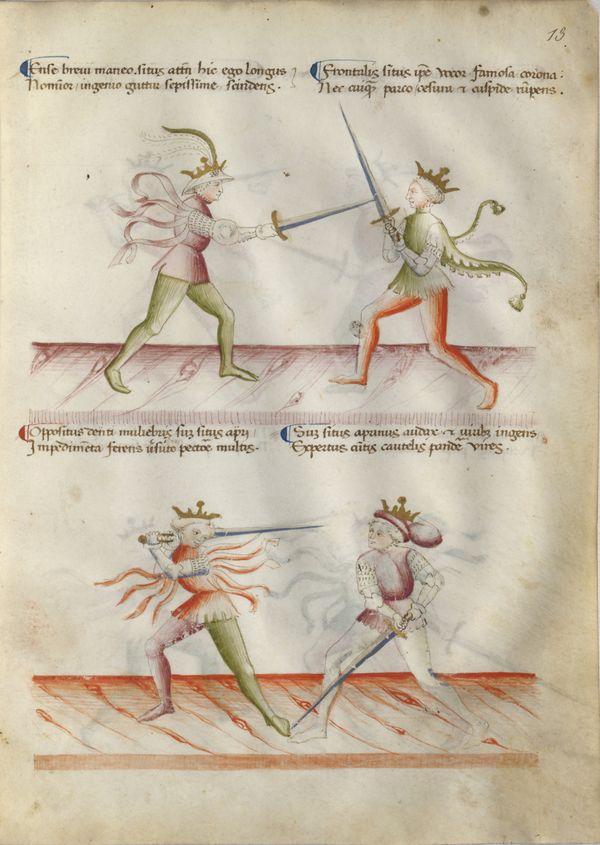|
|
You are not currently logged in. Are you accessing the unsecure (http) portal? Click here to switch to the secure portal. |
Difference between revisions of "User:Kendra Brown/Florius/English MS Latin 11269 13r"
Kendra Brown (talk | contribs) |
Kendra Brown (talk | contribs) |
||
| (13 intermediate revisions by 2 users not shown) | |||
| Line 3: | Line 3: | ||
{{#lsth:Page:MS Latin 11269 13r.jpg}} | {{#lsth:Page:MS Latin 11269 13r.jpg}} | ||
| + | The upper right verse on this page crosses the layout indentations by several letters. | ||
== Italian == | == Italian == | ||
| Line 32: | Line 33: | ||
<poem> | <poem> | ||
| − | {{par|b}} I remain | + | ✅{{par|b}} I remain a short sword, and yet here I am called the Long |
| − | + | position, most often cleaving the neck due to my natural inclination. | |
| − | {{par|b}} I am called the position of the Browband<ref>The Italian and Latin term ''frontale'' refers to a forehead decoration for either a woman or a horse. While the modern English term ''browband'' refers to an element of horse tack, we felt it evoked a more correct image than other terms such as ''headband''.</ref>, that is the famous Crown. | + | ✅ {{par|b}} I am called the position of the Browband<ref>The Italian and Latin term ''frontale'' refers to a forehead decoration for either a woman or a horse. While the modern English term ''browband'' refers to an element of horse tack, we felt it evoked a more correct image than other terms such as ''headband''.</ref>, that is the famous Crown. |
Neither do I spare anyone, cutting and breaking with the point | Neither do I spare anyone, cutting and breaking with the point | ||
| − | {{par|r}} I am the position of the Woman opposite the Boar's Tusk, | + | ✅{{par|r}} I am the position of the Woman opposite the Boar's Tusk, |
| − | + | pregnant<ref>the verb 'fero' (ie, to bear), when linked to a woman, often relates to pregnancy (ie, to bear a child)</ref> with obstacles, with a heart full of cunning toward many. | |
| − | {{par|b}} | + | ✅{{par|b}} I am the position of the bold Boar and unnatural in bodily strength, |
| + | I am well-known for splitting open the strength in every guard | ||
</poem> | </poem> | ||
| + | <noinclude>{{reflist}} | ||
| + | [[File:MS Latin 11269 13r.jpg|600px]]</noinclude> | ||
Latest revision as of 18:44, 3 June 2025
Latin 13r
¶ Ense brevi maneo. situs attamen hic ego longus
Nominor / ingenio guttur sepissime scindens.
- ¶ Frontalis situs ipse vocor / famosa corona.
Nec cuique parco / cesura et cuspide rumpens.
¶ Oppositus denti: muliebris sum situs apri: /
Impedimenta ferens versuto[1] pectore multis.
- ¶ Sum situs aprinus audax / et viribus ingens /
Expertus cunctis cautelis pandere Vires.
The upper right verse on this page crosses the layout indentations by several letters.
Italian
|
I am the Long Stance with my short sword |
[18b-a] Io son posta longa cum mia spada curta |
|
The Frontlet Stance, I am called the Crown; |
[18b-b] Posta frontalle e son chiamata corona |
|
Again, I am the Stance of the Queen against the Boar's Tusk; |
[18b-c] Anchora son posta de dona contra dent de zenchiar |
|
I am the strong Stance of the Boar's Tusk. |
[18b-d] Io son la forte posta de dent de zenchiar |
English 13r
✅¶ I remain a short sword, and yet here I am called the Long
position, most often cleaving the neck due to my natural inclination.
✅ ¶ I am called the position of the Browband[2], that is the famous Crown.
Neither do I spare anyone, cutting and breaking with the point
✅¶ I am the position of the Woman opposite the Boar's Tusk,
pregnant[3] with obstacles, with a heart full of cunning toward many.
✅¶ I am the position of the bold Boar and unnatural in bodily strength,
I am well-known for splitting open the strength in every guard
- ↑ Added later: "aftraro"?.
- ↑ The Italian and Latin term frontale refers to a forehead decoration for either a woman or a horse. While the modern English term browband refers to an element of horse tack, we felt it evoked a more correct image than other terms such as headband.
- ↑ the verb 'fero' (ie, to bear), when linked to a woman, often relates to pregnancy (ie, to bear a child)

